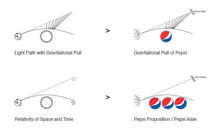It doesn't stop there. It seems that physics concepts are now being misappropriated by marketers. See for example, this article in The Guardian
Metaphorically speaking, Pepsi's gibberish is hard to swallow27 page document can be found here (6MB PDF, right click to save)
Ben Goldacre
Saturday 7 March 2009An extraordinary document called The Pepsi Gravitational Field has been leaked on to the internet. The claim is that this 27-page wonder represents a successful $1.5m (£1.05m) pitch to make a slight modification to the Pepsi logo. Welcome to the science of PR.
"By investing in our history and brand ethos we can create a new trajectory forwards," they explain in the opening pages. This is entirely reasonable. A cognitive linguist by the name of George Lakoff has done some fascinating (and no doubt gruelling) empirical work on metaphors in English literature. He has shown, for example, that we often conceive of the abstract in terms of the concrete: anger is an overheated fluid in a sealed vessel, emotional states are locations, and fascinatingly, we don't just talk about things in this way, we may also reason using these metaphors.
How else can you explain the fact that "baby, we're riding in the fast lane on the freeway of love" is so instantly meaningful to us? Perhaps - and this is speculation - we think about abstract things using brain hardware that originally evolved to deal with more simple visuo-spatial manipulations.

I am open to new ideas. Lakoff may or may not be entirely correct, but he is not throwing words around at random: his ideas are often coherent and stimulating, and they may have explanatory force for real world phenomena. Let us return to the Pepsi document. It is gibberish. "The investment in our DNA leads to breakthrough innovation and allows us to move out of the traditional linear system into the future". This is accompanied by a helpful diagram, which is reproduced here for your delight. "The Pepsi DNA finds its origin in the dynamic of perimeter oscillations," they explain. There is talk of an "authentic geometry". "The breathtaking colour palette is derived," they explain, "using a scientific method of colour assignment based on the product's essence and primary features." They go on to discuss "attraction theory", and the "Pepsi proposition".
This involves the "establishment of a gravitational pull to shift from a 'transactional' experience to an 'invitational' expression." The accompanying diagrams show a "typical light path" being subjected to gravitational pull, and then the gravitational pull of Pepsi. The words "relativity of space and time" appear next to a curved light beam, but the diagram for Pepsi shows many Pepsi logos, distorting the human path through "typical shopping aisle".
Here we find further parallels with conventional physics. "The universe expands exponentially with f(x)=e^x (1 light year = 671 million miles per hour)." One light year is not - if I can anally interject - 671 million miles per hour. Maybe that works because "the Pepsi Orbits" "dimensionalise exponentially".
This might be a useful moment to mention that the new logo is basically the same as the old one, except one of the curves has been changed a bit to look more like a smile.
The Arnell agency has yet to comment on the veracity of the document, but Pepsi certainly announced a revamp in October last year, and from reading his work, Peter Arnell does quite like the word "dimensionalise". At a recent news conference, he also compared his advert for SoBe Lifewater to the achievements of Thomas Edison in inventing cinematography.
And even if this is an elaborate 27-page long spoof, the horror is that it's believable. Across huge swaths of the world, scientific reasoning is regarded as decorative: a rhetorical stance, or a speech in a white coat from a 1950s B-movie. We live in a world that has indulged these buffoons for so long that they think they are heroes, while nerds are regarded with contempt. Our only hope is that after the robot wars, you will all starve, cold and in the rain, wearing leaves and eating mud.
It's up there with French philosophical texts as amongst the most stupid ever written. Good for a laugh.
Incoherent gibberish enough and a physicist's joke.
No comments:
Post a Comment